How is Royal Arch Masonry faring in your locale? At my chapter, nearly 40 miles from home, things aren’t looking so good. In fact, jurisdiction-wide, it’s bleak generally. There are 18 chapters with an aggregate membership far south of 1,300 and, of that, maybe 20 percent are active in any meaningful capacity. But the real problem cited here and there concerns how those who are active are not getting the work done.
Ergo the crisis in gaining new members and getting them engaged in the labors, to wit:
I like to put myself into the shoes of this hypothetical, but not fantastical, Master Mason who recently was exalted into Royal Arch Masonry. He’s about 35 years old and has a wife and young child. He is upwardly mobile in his work and, with his spouse, shoulders the financial responsibilities inherent in maintaining a home and keeping the family safe and healthy while also managing money with an eye on the future and permitting leisurely pursuits. He may have parents, in-laws, or other relatives who are advanced in years and who rely on him for various forms of assistance. He’s very busy with important things practically all the time.
But there is time for lodge. Two nights, maybe more sometimes, each month. It is part of his social life, but it is unique in that he recognizes the sight of masculine maturity with intellectual and spiritual elements. It’s far apart from going to the bar with buddies for beer and big screen TVs. The decorum wrought by ritual, regalia, and tradition gives the effect of turning back the clock to a larger time. The prescribed language clearly is from an earlier century. One’s words and actions convey dignity: learning to listen, when to speak, where and how to move, what to see. Having gone through life without religious culture, he appreciates being exposed to the Craft’s God-centered psychology while absorbing the elements of Masonic language that originate from the Bible, and is amazed upon discovering the many ritualized sayings that are not obviously biblical, but that derive from Scripture nonetheless. He has revealed, cautiously, some of this to select friends, but they show little comprehension, much less interest in hearing more. They ask when he’s available again to ride quads and bikes in the woods.
Through the social media used by area Masons, he hears of a Royal Arch festival. That word—festival—is intriguing. What do they mean by that? From reading about Freemasonry since his initiation, he has an idea of what Royal Arch is: It’s part of the York Rite, and something to it involves completion of the Master Mason’s story. Joining is inexpensive and done in a day, finishing before two in the afternoon on a Saturday, even with time for lunch. He signs up.
 |
| Just an item currently for sale on eBay. Material culture used to be a thing. |
So what is to be done?
For most of my 22 years as a Freemason, I personally have been an enthusiastic proponent of what currently is known widely as Observant Masonry, the embrace of best practices for the lodge that instills meaning and motive into the Craft. The ideas are not mine, but have been advanced by independent groups like the Knights of the North and the Masonic Restoration Foundation; by lodges named Epicurean (Australia), St. Alban’s (Texas), and Vitruvian (Indiana); and by eminent individuals like John Mauk Hilliard of New York, and Andrew Hammer of Washington, DC. If you read this blog with any regularity, you likely know what it’s about, but the key elements include:
- exclusivity in membership
- elegance in dress, including regalia
- expertise in leadership, including ritual work
- education in the practical and esoteric
- excellence in dining
There are other points, but let’s unpack these five.
Exclusivity in membership – Our grand lodges are slow to realize it, but it’s true that not every man is right for Freemasonry. My grand lodge (New York) gets it, but the compulsion to reveal the mysteries of Freemasonry to every man who can fog a mirror persists generally. Similarly, not every Master Mason is a benefit to Capitular Masonry. Once the petition is received, it becomes very difficult to enforce selectivity, so don’t blanket recruit. Put a lot of thought into who you approach. Look for the one who seeks advancement in Masonic knowledge, who has a talent for ritual work, and who is a pleasure to be with. Those guys who just want to become Knights of the Whatever? Let them join another chapter.
Elegance in dress, including regalia – It’s self-explanatory. I don’t think black tie is absolutely necessary all of the time, but everybody should make certain he is wearing a conservative suit that fits. If your personal apron has a lot of gold, good for you, but if you are serving as an officer, best to leave it inside your apron case and instead wear a chapter officer apron for uniformity. If the aprons at your chapter look like they’ve been used to check engine oil, replace them with new ritual garments, and keep those clean and dignified.
Expertise in leadership, including ritual work – One who sits in the East of a chapter must have a head for business and a heart for fraternity. We need smart and organized men who can communicate. There actually are guys out there who think wearing a PHP apron will help them get the 33º. (Worse, sometimes they are right.) Maybe it will be necessary to coax a few PHPs into serving as officers until the chapter rights itself, but in the meantime, only accomplished Masons who take an interest in the chapter’s success need to hold officer positions. I won’t touch on the secretary’s desk, because it goes without saying. In ritual, be patient. Not everyone can handle large speaking parts, but practically everyone can do something. Place talent where it makes the most sense, and if someone isn’t working out, replace him. Do not permit him to advance to more complicated parts. If you cannot confer a degree, don’t. Get help from outside.
Education in the practical and the esoteric – Okay, so there isn’t a lot of literature on American Royal Arch Masonry available, despite the Order being pregnant with educational and spiritual heft. Fortunately, Piers Vaughan, a Past MEGHP of New York and a Mason with an international reputation, authored two books in 2014 to help us. Introduction to Capitular Masonry is an easy-to-digest 46 pages that covers the basics. Piers explains the fundamentals of rituals, symbols, chapter structure, history, and a lot more. The Chapter Walkabout is meant to benefit the newly exalted, but in truth it probably would benefit all of us. Your chapter should be giving this book to all
Piers’ other Royal Arch book is titled Capitular Development Course. Not a sexy title but, weighing in at a substantial 153 pages, it delivers highly useful education and is very approachable. Like a workbook you used in school, this has a quiz after the chapter of each degree. Let’s face it, modern man is largely ignorant of the Bible. This leaves him in precarious darkness in a Masonic setting, particularly the Royal Arch chapter, but this book (keep a Bible handy for reference) is immensely helpful in decoding what these rituals are about. Give this to your new and old companions too!
Excellence in dining – I concede odds are there must be a few Masons whose idea of the perfect Masonic meal differs from mine (mutton, Bordeaux, sautéed spinach, mushrooms, fries the size of a corona gorda, brandy, tobacco, tawny port, dark chocolate of some kind, coffee, a lush whiskey, and tobacco), but surely it’s pretty easy to provide a good meal everyone can enjoy. See what your local restaurants can cater. Or maybe you all can eat there. Whatever it is, make sure it is enjoyable. Our English word “companion” originates in the Latin (com = together with, and panis = bread) for “breaking bread with another.” But don’t eat just bread. Make every meal special. Together.
I realize I am omitting a lot, but I have seen it is difficult to instill even these modest concepts into a lodge. We all want everything to be perfect, but the definition of perfection varies from place to place, and from man to man. One’s biases, formed by repetitive experience and comfortable habit, can inhibit learning and understanding so that suggesting new practices to an existing lodge often causes defensive friction. Meanwhile, building a lodge on a foundation of the “Observant” ideas frequently produces a new lodge of only frustrated refugees from those fractious lodges, with no candidates for initiation in sight. Rarely is there a “Goldilocks Lodge” wherein everything feels just right.
But in the Royal Arch chapter, things can be very different. These are locally managed items. You don’t need to secure anyone’s permission to buy new aprons, upgrade the meals, and master the ritual. Just do it, and you’ll see success breeding success in time. There’s a smallness in Royal Arch that permits both intimacy and portability. If your chapter has a membership of, say, 40, and about 15 attend convocations, your chapter is doing well. If the chapter has 75 companions and, say, 22 attend regularly, that’s good, even if maybe it doesn’t look so mathematically.
And with the smallness comes less bureaucracy. You’re not making Masons, so there isn’t a need for so many moving parts. Sure the secretary has to file annual returns in December, but there is far less time wasted for the rest of us in, what I’ll call, genuflecting during the rest of the year. And there probably are fewer meetings per year for your Royal Arch chapter as compared to your lodge. Maybe your chapter doesn’t even meet monthly, like mine, which holds convocations every other month. All that time to prepare can let you focus on excellence if you want. If you don’t, then the time spent between meetings will breed neglect.
Smallness can help you move around the jurisdiction. If the lodge where your chapter is settled does not, for whatever reason, feed the chapter new members, then moving the chapter’s charter shouldn’t be that difficult. Changing meeting nights or times also should be simple, if that will help you. Your chapter should be meeting the needs of its companions; expecting the reverse to occur is not realistic.
Maybe small size chapters are part of our future. What is wrong attaching chapters to lodges in significant numbers? Instead of having one chapter serving 10 to 20 lodges, have 10 micro chapters serving 20 to 30 lodges.
What prompted this, the longest edition of The Magpie Mason in many months? My own chapter is facing its demise unless we reverse its most obvious problems. At our November convocation, the DDGHP visited to remind us that Grand Chapter will meet in March, and that we have until then to install a line of officers who can simply open the chapter without reading the ritual. That’s the basic requirement, but it’s enough so that our 162-year-old chapter will have a 163rd year. On the down side, we will have only one meeting (January 10) before March, and I don’t see evidence of the companions getting organized. For my part, I responded to a complaint made about the absence of Masonic culture from the chapter’s meetings by volunteering to attend every convocation of 2020 to speak on some aspect of Royal Arch Masonic Light, be it about ritual, symbol, history etc., and also to write something introductory about each talk for the bulletin going to the membership at the start of the month. No one does that, but it’s something I can do.
The day after our DDGHP informed us our clock is ticking, I began asking around to see what other chapters on the planet have done to achieve the successes that have eluded us. Hatrock (speaking of the Knights of the North!) sent me a link to his chapter, Norwood 18, in Alberta.
Click here. Behold the banner on the homepage: A Sanctuary for the Master Mason Seeking Further Light in Masonry. Yes, that’s it! That’s it in one phrase!
Look for the Chapter Principles, or “What sets Norwood Chapter apart?” Ten items:
- Ritual Excellence
- Enlightening Education
- Elegance of Dress
- Chapter Ambiance
- Non-Traditional Timings
- Festive Board
- Two-Year Terms of Office
- Fewer Meetings
- Selectivity
- Commitment
“Norwood Chapter offers Royal Arch Masonry at its finest.”
Peruse the entire website. It’s a little out of date, but the important information doesn’t age.
Last Sunday, the All Things Masonic blog shared the news of Iron Range Chapter 70 in Minnesota. A new chapter! It is chartered to travel about the area, serving a 30-mile radius.
 |
Courtesy All Things Masonic
Iron Range Chapter companions in Minnesota. |
The wonderful Midnight Freemasons (Todd Creason, Gregg Knott, et al.) site published a story several years ago about Admiration Chapter in Illinois. “We wanted a new chapter—a more regional chapter. We wanted a chapter with a particular focus on Masonic education and member development,” Creason writes in 2016. “We wanted a chapter that wouldn’t only thrive, but could serve as an education resource to other York Rite chapters and Blue lodges in the area. And the Grand Chapter liked that idea very much.”
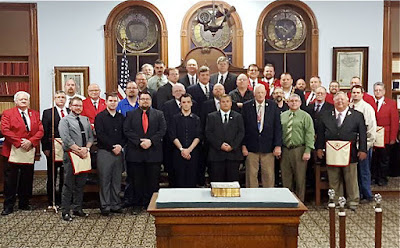 |
Courtesy Midnight Freemasons
Admiration Chapter companions in Illinois. |
I followed up with Greg Knott (a fellow Masonic Society board member!) last week, who reports they’re “still going strong” especially with the education work.
One last, quick, funny/sad story: In asking around for ideas for reinvigorating Royal Arch Masonry in my jurisdiction, I contacted the Supreme Grand Chapter of England; I follow a number of its chapters via social media, and they appear to be doing well. I briefly explained why I’m seeking advice on what makes English chapters successful, and expressed hope that someone there might reply with a few examples of what works best and why. Instead, someone there complained about me to the General Grand Chapter of Royal Arch Masons International, which then complained about me to my grand secretary (who knows me all too well), and—long story short—alack, no information on Royal Arch success English-style would be forthcoming.
 |
| One concept from England I found: Introductory events! Of course, Mark is its own order in England, but you get the idea. |
I’ll conclude with a few Big Picture items:
Can we retire the Virtual Past Master Degree, please? I suppose this would require some legal work, like a few constitutional amendments—and I realize it would be a hard sell to those who say a motion to buy new aprons is a hot-headed idea—but it would be a smart way to lighten the ritual load on the chapters. And we shouldn’t reveal the secrets of the chair to whom of right they do not belong, yes? Canada, England, and most (all?) other jurisdictions around the world do not work a VPM Degree.
What is the General International thing? I mean I know basically what it’s about, but why do we still have it? What does it do? Why are we paying for it? I admit to not liking anything with “international” in its name—except maybe the pancakes restaurant—but if your grand chapter withdrew from the General, would you or your chapter even notice?
There was supposed to be an emergency meeting of my chapter’s PHPs on December 13 to plan our immediate future. It’s already the first of the month, but I haven’t heard a word about this meeting yet. It’s really a shame.






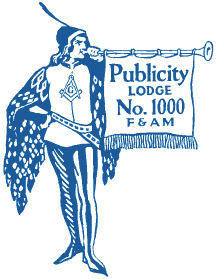











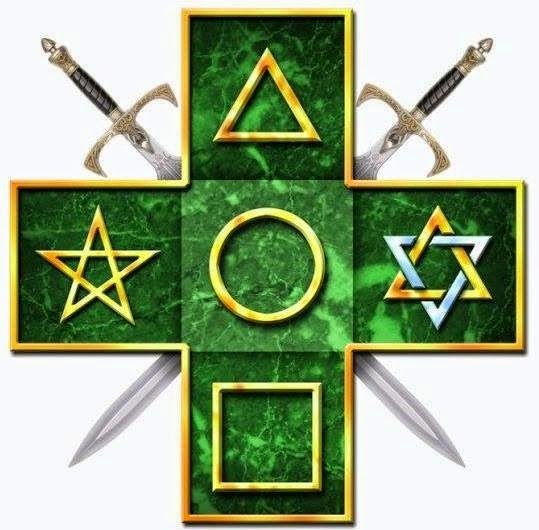














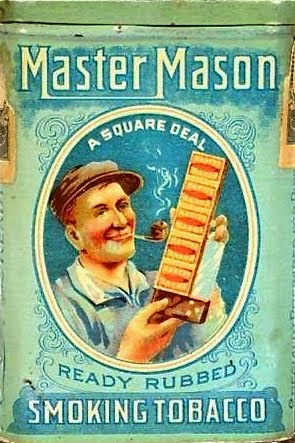













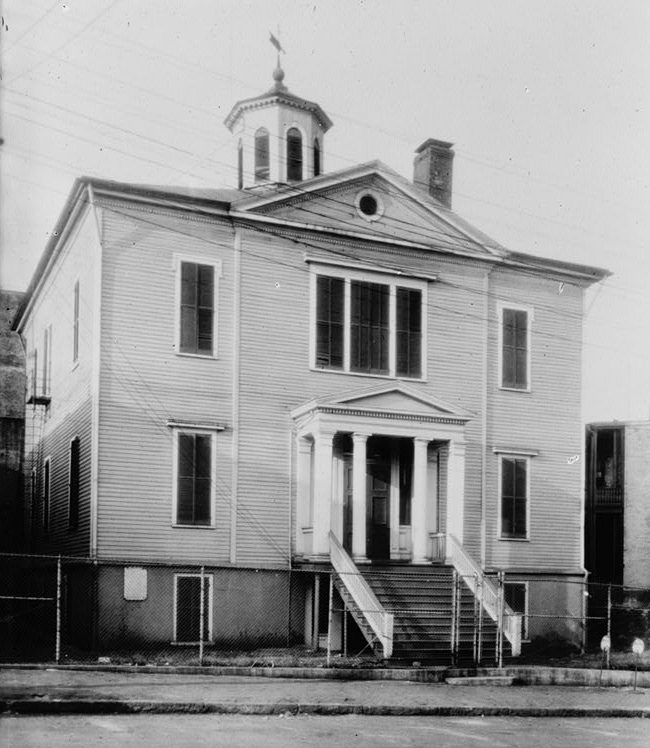

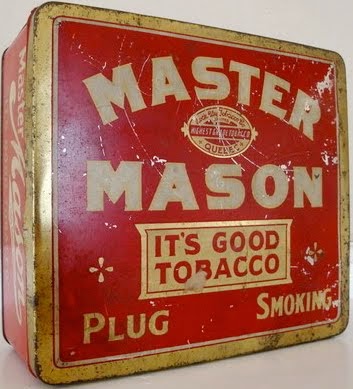




No comments:
Post a Comment